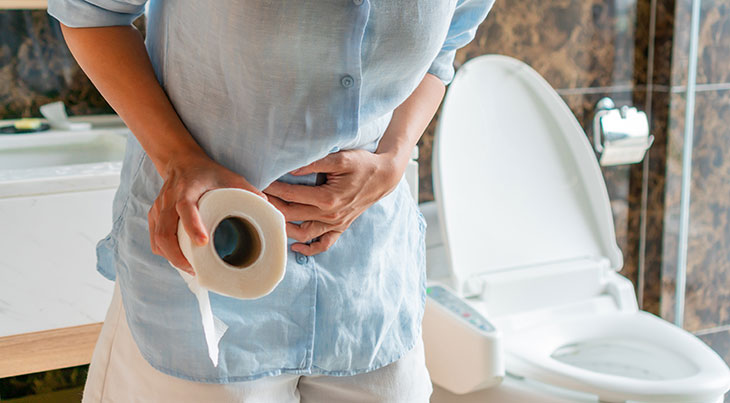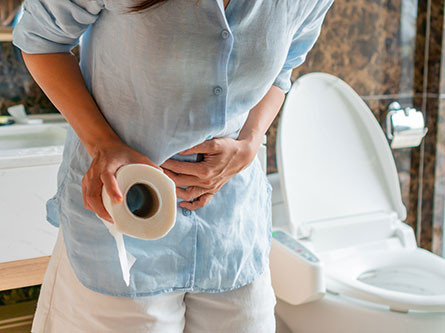
We've probably all been on either end of the digestive spectrum: unable to go No. 2 or having it all flow out. Diarrhea and constipation are very common conditions for people of all ages.
These digestive issues can last a day or two – but sometimes they last longer. Here's some information on causes of diarrhea and constipation and tips to clear up irregular bowel movements.
What are the symptoms of diarrhea?
Diarrhea means having loose or liquid stool. For most people, diarrhea is mild and goes away within a day or two. However, other times it can be a sign of a more serious condition. It can cause dehydration and may prevent your body from holding onto nutrients.
Aside from watery stool, other symptoms of diarrhea include:
- Bloating or cramping in your stomach
- Strong and urgent need to poop
- Upset stomach or nausea
With severe cases of diarrhea, you may also have other symptoms. These could be signs of a serious medical issue:
- Fever
- Severe pain
- Vomiting
- Blood or mucus in your stool
If you have these other symptoms or symptoms of dehydration, contact your health care provider.
See how you can use Telehealth Express Care for urgent needs
Are there different types of diarrhea?
There are three types of diarrhea:
- Acute diarrhea: This is the most common type of diarrhea. It usually lasts a couple days or less and gets better without treatment.
- Persistent diarrhea: This type usually lasts a couple weeks to a month.
- Chronic diarrhea: This can last a couple months or comes and goes over and over. It could be a sign of a serious condition.
Your stool may also be a different color than normal. The color of your stool may be connected to what you're eating.
- Yellow diarrhea: If it's more yellow than brown, it could mean that you have too much fat in your diet. Your body may not be digesting food properly. Yellow stools could also mean that you have celiac disease. This is where your body isn't able to process gluten, which is in many breads, pastas and pastries.
- Green diarrhea: Greenish stool can be normal and isn't usually cause for concern. Green diarrhea could be a sign that the food moved too quickly through your body. It could be from eating green foods, such as kale, spinach or even drinks with green food coloring.
Find out more about what the color of your stool might mean
What conditions may cause diarrhea?
Diarrhea is often caused by a virus in your gut (stomach area). Some people call it the stomach flu. It can also have many other causes, including:
- Eating foods that upset your digestive system
- Bacterial infection (such as food poisoning) or other organisms
- Allergies to certain foods
- Taking too much laxative
- Reaction to certain medications like antibiotics or cancer drugs
- Diseases of the intestines, such inflammatory bowel disease, including Crohn's disease or ulcerative colitis
- Some cancers
- Surgery on your digestive system
- Trouble absorbing certain nutrients
- Overactive thyroid, known as hyperthyroidism
When should you seek treatment for diarrhea?
You should see a health care provider if you have the following symptoms:
- Diarrhea that lasts longer than two days
- Blood in your stool or black stools
- Fever above 101° F that lasts more than 24 hours
- Severe pain in your stomach or rectum
- Nausea or vomiting that prevents you from drinking liquids
- Diarrhea after returning from a foreign country
- Symptoms of dehydration
If you don't want to go into an office for an appointment, our Telehealth Express Care may be a better option. Whether you're a UC Davis Health patient or not, you can use this virtual urgent care to speak with our providers from the comfort of your home. Appointments are often available on the same day.
Learn why you should partner with a primary care provider for your health
Are there at-home treatments for diarrhea?
If you have diarrhea, you can use at-home remedies to help get rid of it.
- Drink plenty of fluids, such as water, drinks with electrolytes, tea, and even nonfat chicken broth. Avoid caffeine and alcohol as these can dehydrate you more.
- Eat the BRAT diet, which includes bananas, (white) rice, applesauce and toast. These foods help firm up your stool.
- Avoid foods that can cause gas, such as beans, brussels sprouts and carbonated drinks. You should also avoid dairy because diarrhea can make you temporarily lactose intolerant.
Check out why it's so important to drink water and stay hydrated
What are some symptoms of constipation?
Constipation happens when you have few or no bowel movements. The number of bowel movements is different from person to person. Some go multiple times a day, whiles other go a few times a week.
Typically, if you go more than three days without a bowel movement, it will get harder to pass a stool. Some other constipation symptoms include:
- Hard or small stools
- Not feeling like you got everything out
- Bloated stomach
- Stomachache or cramp
- Back pain
- Feeling like your rectum is blocked
What can cause constipation?
There are many causes of constipation, which can lead to some discomfort and pain. They can range from things you've eaten to more serious conditions. Here are some causes:
- Changes to your diet, activities or daily routine (such as traveling)
- Not drinking enough water or eating enough fiber
- Eating a lot of dairy products
- Not being active
- Not going poop when you need to
- Stress
- Older age
- Pregnancy
- Intestinal obstruction
- Diverticulitis
- Using a lot of laxatives
- Some medications
- Eating disorders
- Irritable bowel syndrome
- Issues with your digestive system
- Colon cancer
- Neurological conditions such as Parkinson's disease or multiple sclerosis
- Underactive thyroid (called hypothyroidism)
Explore our digestive health and gastroenterology services
What are some natural ways to help relieve constipation?
If you have constipation, you can try some things at home to help you go No. 2. These include:
- Drinking more water – an extra 2-4 glasses per day.
- Add more fiber into your diet, such as through vegetables, seeds, and whole grains. You can also take over-the-counter fiber supplements. Start with a little at first and see how your body reacts.
- Eat prunes or drink prune juice.
- Exercise, which can help get things moving in your body.
- Avoid caffeine and alcohol, which can make you more dehydrated.
- Avoid reading or using your phone while you're trying to go. Focus on your bowel movement. Give yourself time to relax.
When should you see a health care provider if you had constipation?
You should see a health care provider if you have severe stomach pain, blood in your stool (if you do have a bowel movement) or lasting constipation.
See how to use Telehealth Express Care, whether or not you're our patient
This blog was medically reviewed by pediatric gastroenterologist Daphne Say, M.D.




